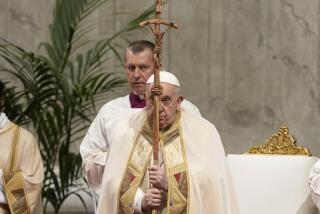Pope Francis balances visits to Jewish, Muslim sites in Jerusalem
- Share via
Reporting from Jerusalem — A day after he threw his moral weight behind the establishment of a Palestinian state, Pope Francis paid tribute Monday at the grave of Theodor Herzl, the man whose dream of a Jewish homeland led to the creation of modern-day Israel.
It was a finely balanced gesture on the last day of the pontiff’s visit to the Holy Land, where even the smallest acts are fraught with political symbolism. The wreath-laying here in Jerusalem also sought to wipe away bitter memories of a previous pope’s rejection of Zionism more than a century ago.
Francis bowed his head and, following Jewish tradition, laid a stone on Herzl’s grave as Israeli President Shimon Peres and Prime Minister Benjamin Netanyahu stood silently to one side.
The move is likely to annoy many Palestinians, who blame Zionism for the confiscation and occupation of their ancestral lands. But a day earlier, Israelis were themselves dissatisfied with the pope’s decision to travel directly to Bethlehem, in the West Bank, from Jordan rather than arrive in Israel first, and with the Vatican’s pointed reference to the “state of Palestine.”
In another display of the delicate political juggling act that the Holy See has had to manage, Francis also accepted Netanyahu’s suggestion of an unscheduled visit Monday morning to a memorial to victims of terrorism. The move was clearly a counterpoint to the pope’s unexpected stop Sunday, at the urging of Palestinian leader Mahmoud Abbas, at a section of Israel’s security barrier on the edge of Bethlehem, where Francis touched the wall and said a prayer.
Palestinians view the partition as an Israeli attempt to carve up and claim parts of their rightful territory, while Israeli officials insist that the barrier is necessary to keep their people safe from attacks such as suicide bombings.
“If incitement against Israel stops and terror ends, there will be no need for measures we take such as the security fence, which has saved thousands of lives,” said Netanyahu, who held private talks with the pope at a Catholic church. “I await the day that Pope Francis’ call to recognize the state of Israel, the right of the Jews to a state of their own, to live in security in peace, is accepted by our neighbors.”
The stops at Herzl’s grave and the victims’ memorial were among the many events on Francis’ packed schedule Monday. The pope prayed at the Western Wall, where he followed the example of Jewish worshipers by tucking a note between the ancient stones. On it, he had written the Lord’s Prayer in Spanish, “the language I learned from my mother.”
He also took off his shoes and visited the Dome of the Rock, the mosque built on the holy site that Jews call the Temple Mount and Muslims refer to as the Noble Sanctuary.
“From this holy place, I make a heartfelt plea to all people and to all communities who look to Abraham: May we respect and love one another as brothers and sisters,” the pope said. “May we learn to understand the sufferings of others, may no one abuse the name of God through violence, may we work together for justice and peace!”
At Yad Vashem, which commemorates the millions of dead in the Nazi Holocaust, Francis clutched and kissed the hands of six survivors who recounted their stories. He described the Holocaust as an “enduring symbol of the depths to which human evil can sink” and wrote “Never again!” in a book for honored guests.
The Vatican has described the papal visit as a religious journey, but Francis has not refrained from calling on Israeli and Palestinian leaders to pursue diplomacy and implement a two-state solution for peaceful co-existence.
On Sunday, he unexpectedly invited Peres and Abbas to the Vatican next month to pray for peace. Both men have accepted.
While analysts do not expect the prayer meeting at the Vatican to produce any breakthrough in the stalled peace process, it could improve the atmosphere and provide a modest impetus to renewed efforts.
Peres, who is 90, thanked the pope for his intervention.
“I believe that your visit and call for peace will echo through the region and contribute to revitalizing the efforts to complete the peace process between us and the Palestinians, based on two states living in peace — a Jewish state, Israel, and an Arab state, Palestine,” Peres said.
Special correspondent Sobelman reported from Jerusalem and staff writer Chu from London.
More to Read
Sign up for Essential California
The most important California stories and recommendations in your inbox every morning.
You may occasionally receive promotional content from the Los Angeles Times.














